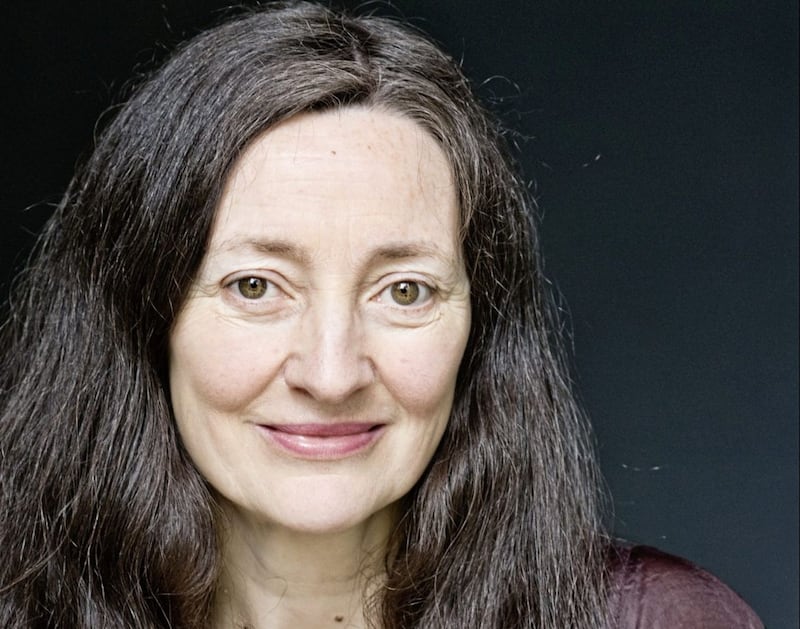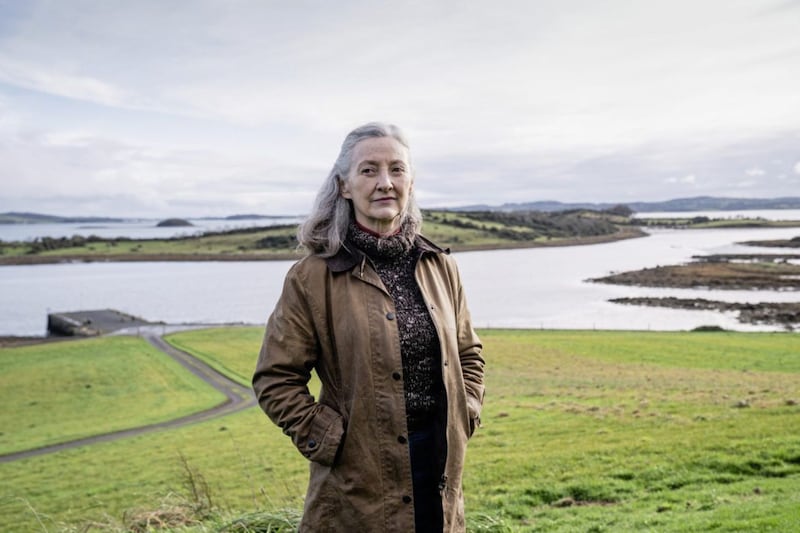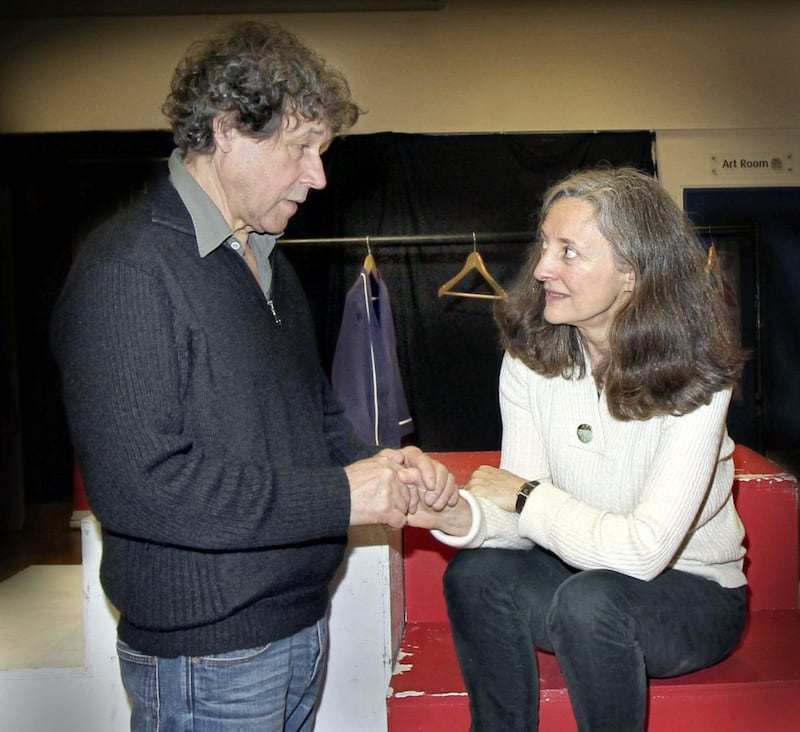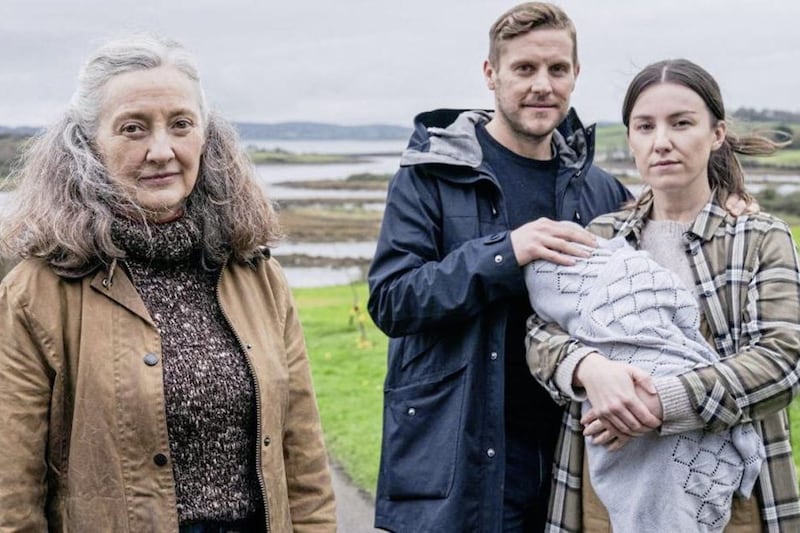
GREAT actors are often linked to one key role. So Bríd Brennan is forever pinned in our imagination as Agnes Mundy, the sister who knits quietly and looks out for vulnerable Rose in Brian Friel's Dancing at Lughnasa.
She created the role in 1990, gained a Tony for the New York production in 1992, then reinterpreted it on-screen in 1998 alongside Meryl Streep.
Of course Brennan has played many other parts on stage and screen, and will tonight receive the prestigious Realta Award for 'outstanding contribution to cinema' from the Belfast Film Festival.
Speaking down the line from her home in east London where she moved "long before the area was trendy", Brennan says: "I was absolutely delighted and surprised. I didn't know the award but it warmed my heart."
Her most recent work in an impressive filmography is Dioneann, an Irish language drama just released by DoubleBand Films. It includes a brooding landscape, death, subtitles, fractured relationships and the kind of left-field law officer (Labhaoise, played by Brennan in a mac) that makes you think Scandi-noir.
Brennan doesn't entirely agree: "It has some of that but I like to think Dioneann is setting a new trend, in language and in landscape and in something coming out of our culture. There is definitely an Irish take (on things)."
The plot hinges on the seemingly successful life of an investigative reporter who has been looking into the criminal underbelly: "He gets mixed up in the crime world and the fact he isn't the prosperous man he appears to be on the surface is a great thread."
What you notice in Brennan's performance as the retired cop on the small island is the way her face and speaking eyes reflect her thought processes. As the late Dirk Bogarde said, film acting involves stillness and the camera captures the actor's mind.
"I agree with Dirk Bogarde and that's a very nice quote," she says. "It's how I most like to work. If you think yourself into a character, you hope it will be there on camera."
She mentions a scene which illustrates this. "This woman hasn't been doing her job in a long time. She could say so much but is enigmatic. Yet when she talks to the man's wife, Siobhán, about what her life was like with Tomás, she gets the denouement.
"There's something about this young woman's life that she is open to. I don't want to give away the ending but Labhaoise makes a decision based on the fact she trusts her." The filmed exchange between the abused wife and older woman is touching.
Although not a fluent Irish speaker, Brennan used lockdown to brush up her Gaelic. "I knew a little bit and went to the Gaeltacht one summer a long time ago. When this production was suggested April before last, then postponed, it gave me time to sign up for a Zoom course with the college in Glencolmcille in Donegal but I couldn't have done it without the help of Doubleband's Órfhlaith Ní Chearnaigh. I'd like to do more."

So does Brennan prefer working in film or theatre with their different methodologies?
"When I did Dancing at Lughnasa, I lived with the first production of Brian Friel's play for about two years. I knew Agnes would be a difficult part to play as she says very little. Yet she tackles the authority of Kate, the elder sister, as in the end she just can't take it any more," she explains.
"Revealing the person in thought was a challenge but I have a real passion for that play. It was a great ensemble piece although (my role) was quite hard to sustain."
Funnily enough, Brennan knew the film version would be a relative doddle. "When I was asked to do the film, I thought I already knew how to do it. My only concern was would it have that freshness or would I be too big in character as the genie was out of the bottle?"
She needn't have worried. Although film and drama work differently, Friel's genius translated. As Brennan observes: "Brian's masterstroke is the dance coming out of the tension in the kitchen - the sisters' wild, cathartic dance. He directs from the page and even notes how each woman dances, the different rhythms."
Brennan admits that the big screen treatment slightly sentimentalised the piece. "Hollywood makes it look much more beautiful and maybe the dancing became more joyous, less wild in the bigger frame. Having said that, the play's about memory, seeing a golden time with underlying tensions and we had a golden corn field on set in the first production. There was the tension between memory and romantic memory and the sadness of what happens."
Brennan finally declares her allegiance to the big screen. She recalls being taken to see George Stevens's classic Western Shane in Belfast by her elder sister. "I remember the colours, the blue of the sky and the red and white of candy sticks. I remember thinking 'What is this?'"
As Brennan reveals, she had to start out in the theatre. After studying French and English at Queen's, she travelled, then applied to drama college in London.
"I got into one but soon realised it wasn't a real drama college and just had novelty value. So I didn't train but after some National Student Theatre which gave me a taste for it - I played the mother in The Death of Private Kowalski on Edinburgh Fringe - I went to Dublin."
There she found work and excitement. Having worked at the Gaiety, the Olympia, the Gate ("all crammed into just a year") and put in productive time in community theatre including Jim Sheridan's outfit, Brennan was 'spotted'.
She was cast as Roisin, the sister, in Maeve. This was Pat Murphy's groundbreaking 1981 film about feminism and Northern Irish identity. "It was my first real film, very low budget, with a small crew making the film in Belfast and living off the lower Ormeau Road."
As she says it is a story that we know, about a young woman leaving Belfast to go to college in London. On returning home, her newly liberated ideas and debates clash with her home community. "That would include how she handles her sexuality, yes, and the Church gets involved."
One line in the movie sums up the way this resonates more widely is when Maeve observes "men's relationship with women is like England's with Northern Ireland".
But as Brennan explains, her character, while not traditional, remains "more embedded in her community".
She acted in Mike Leigh's early Four Days in July (1984), one of his improvised pieces centring on two couples' reactions to the Twelfth.
"That was fun, he'd ask you everything you knew. Leigh loved learning about the Northern Irish experience revelled in it. You're led by the nose and it was fascinating."

Brennan touches on the "allure of good writing" that has also led to exciting stage roles. She was Lorna in The Billy Plays.
"Graham Reid, who wrote them, was interested in family and referred to Sean O'Casey. I remember Jimmy Ellis did that volcanic anger of the father so well. How difficult it was to live like that in a tiny house. My character was responsible for the younger children, had no social life and was living in a male dominated world which was sad. I tried to make her push back a bit."
Then there's Shakespeare. Much later on, Brennan helped provide artistic competition to the Olympics in 2012 at London's Globe Theatre. She played the Chorus in Henry V, setting the scene with the rousing "O for a muse of fire" speech. She has said she knew she'd be acting in front of a potentially cold audience, spotted one woman who was almost blue, and addressed the whole opening speech to her, emphasising the heat.
Brennan feels that her most intense theatrical experience was undoubtedly in The Playboy of the Western World. "We travelled to Inish Meáin, one of the islands Synge visited, and were out in a force 8 storm on a converted trawler to the community centre. We could see pinpricks of light far away as the islanders came out with their torches and lights."
Having arrived at the village and gathered an audience, Brennan was waiting to go on as Pegeen with Druid Theatre. "I see it as about the loneliness of the human heart in a lonely landscape with people looking for each other. The villagers were there, with some of the older women in red petticoats talking Irish. Then as I counted down to my entrance, I felt a presence at my back. I looked behind me at the sheer Atlantic blackness and thought if I never have another night on stage, that's all right."
A very different role Brennan would like to try is that of Winnie, half buried in the earth in Beckett's Happy Days.
Brennan may have chalked up Doctor Who (as The Visionary) and dark episodes of Cracker but it's the serious film work she returns to, like Shadow Dancer for which she won an IFTA.
"Again, I felt something about the mother's silence and was drawn to her quiet demeanour." She describes caring for her daughter, the double agent played by Andrea Riseborough, as "a woman doing what she does for her family". Keeping quiet.
As you go on, Brennan says, "you sometimes think, 'I've learnt a bit'. Then sometimes, you think 'How did I have the nerve?'"
But the screen is in a sense this brilliant actress's passion and main stage. Brennan would be "very much" interested in doing something on climate change and recommends a film titled Fire Will Come in Galician.
She also has a new film in the can, My Sailor, My Love, a mature love story. As Bríd Brennan says with uncut enthusiasm, "It was film I'd always wanted to do."




